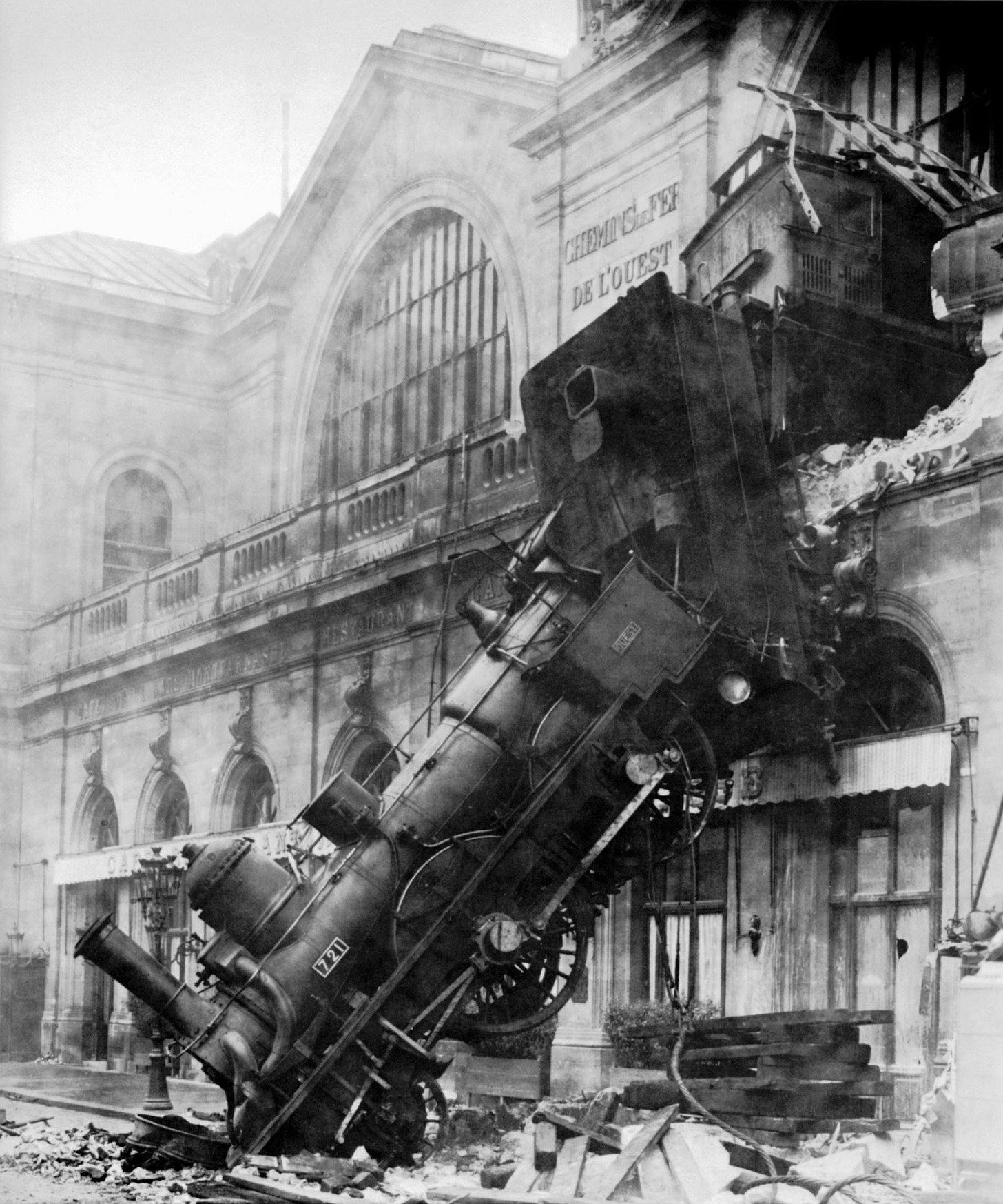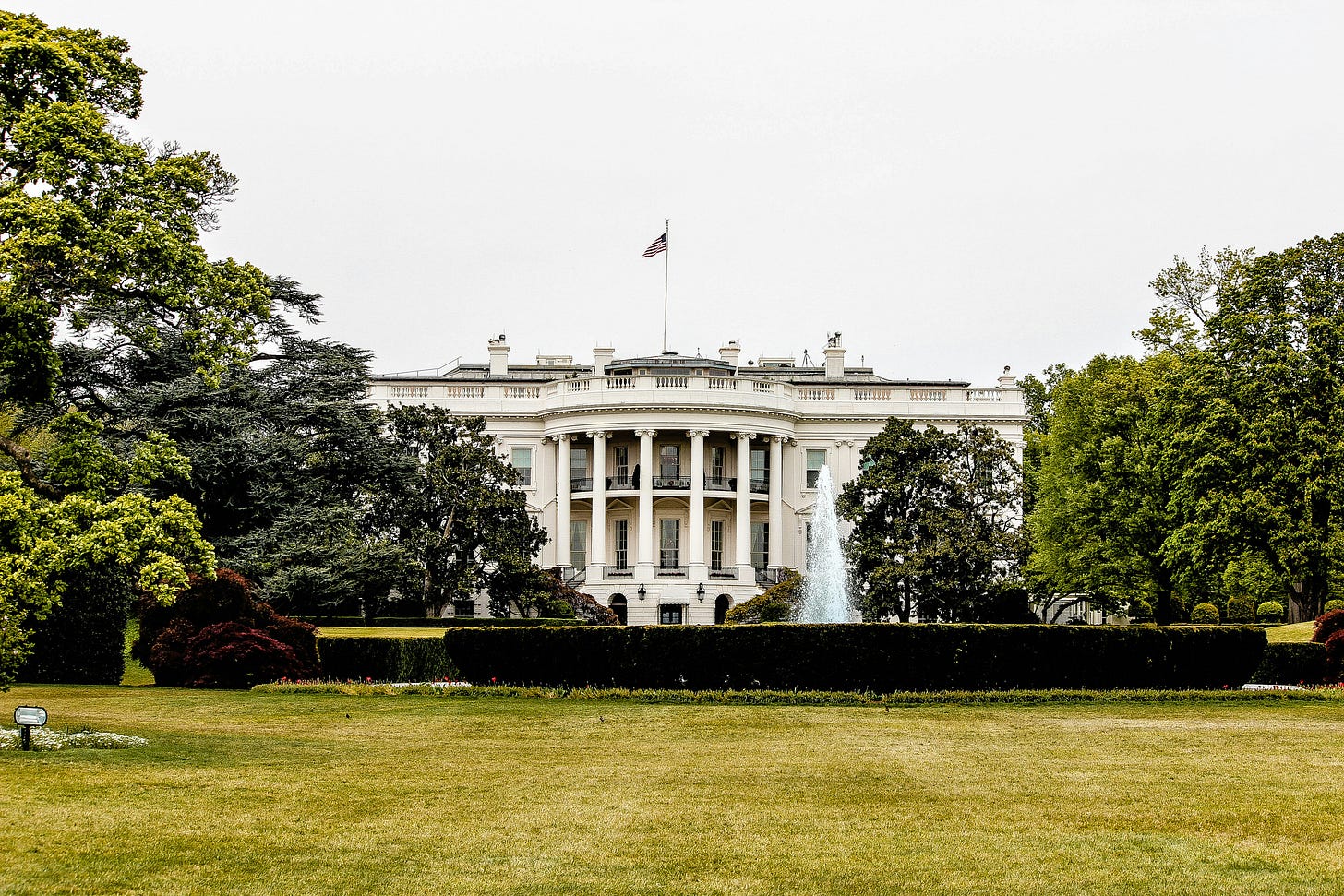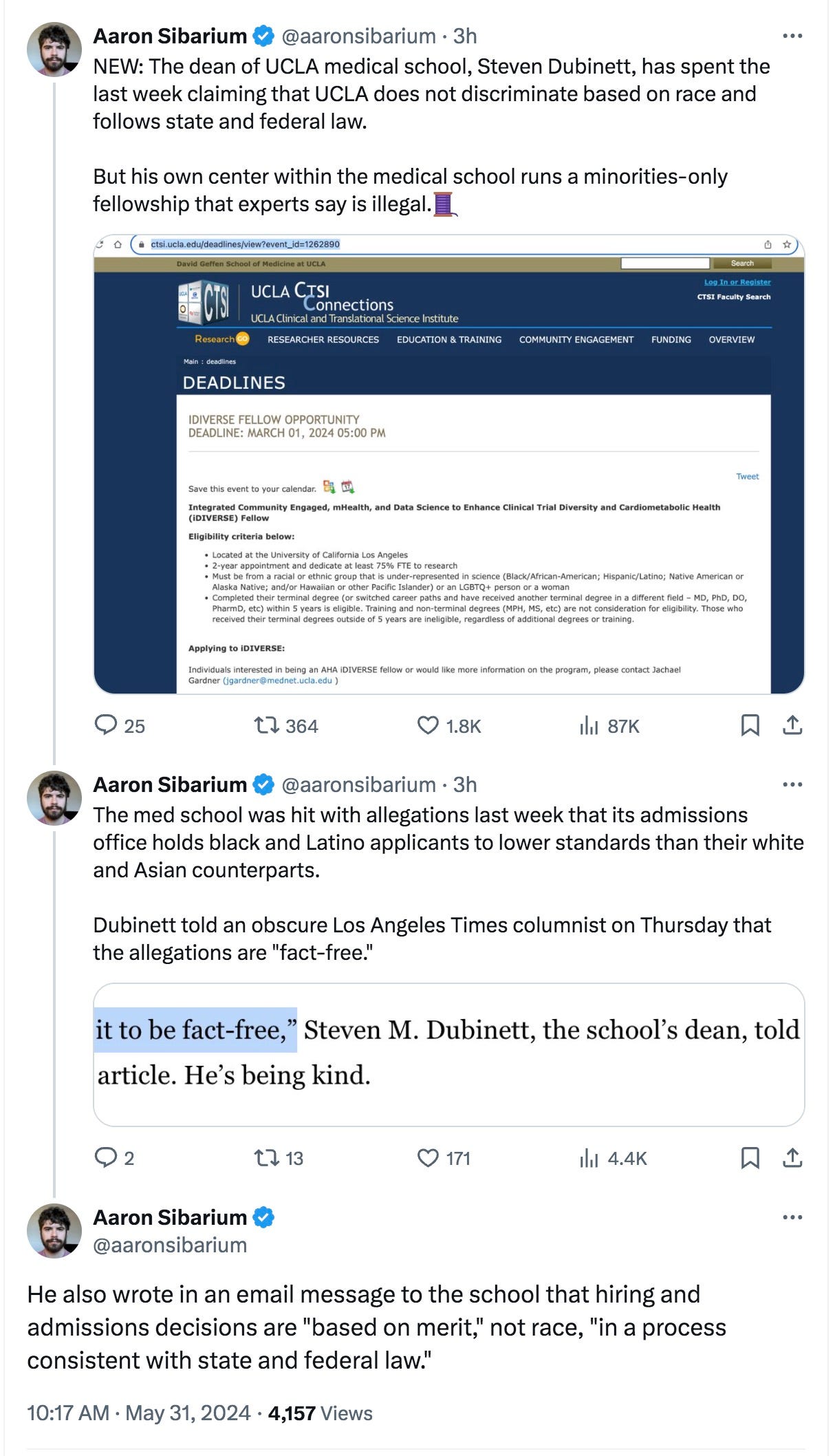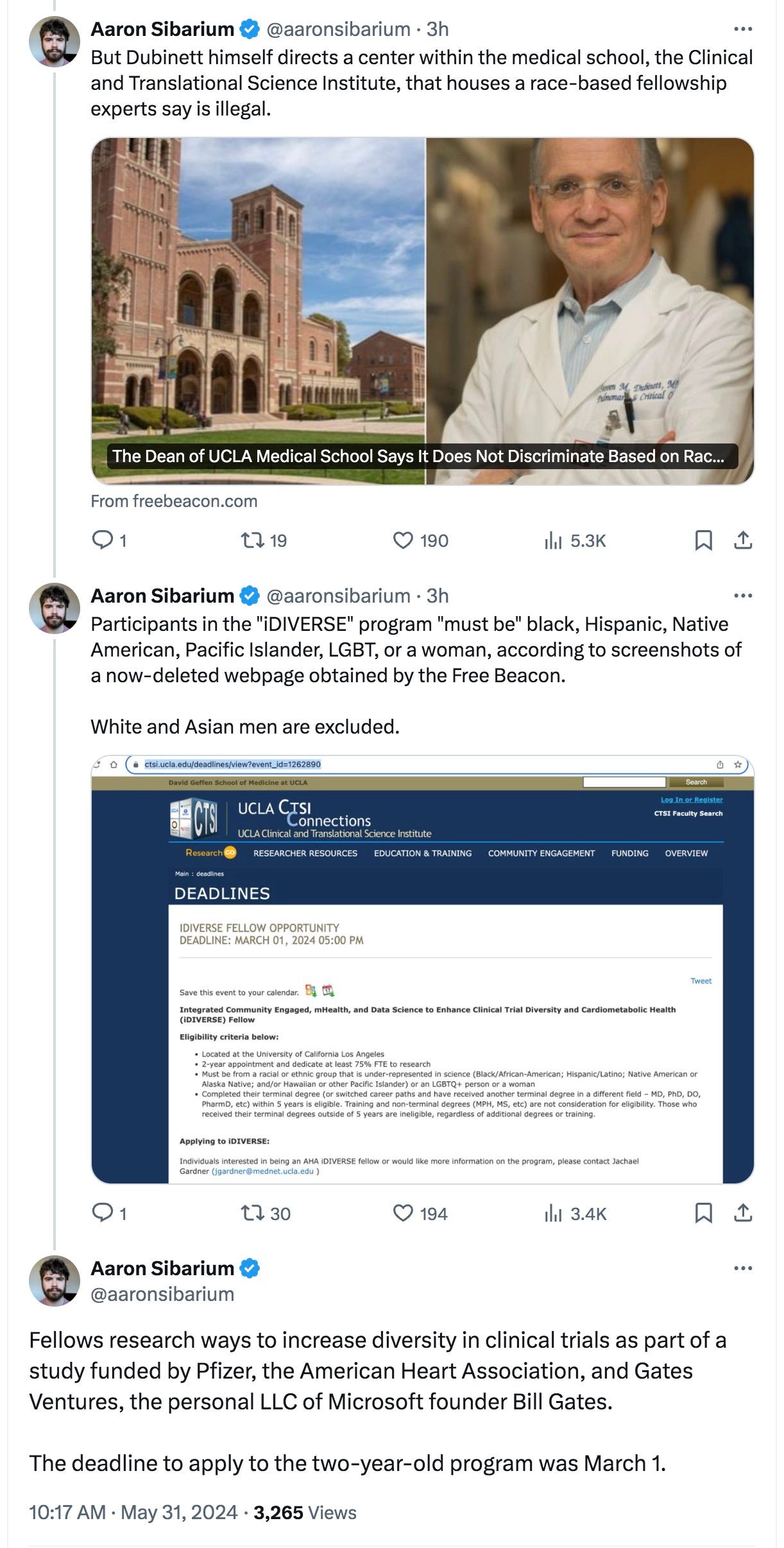E-Pluribus | May 31, 2024
It was the worst of times - not; disparate impact is in trouble; and loving to hate.
A round-up of the latest and best musings on the rise of illiberalism in the public discourse:
Jonah Goldberg: Things Have Never Been Worse? Really?
It was the best of times, it was the worst of times, wrote Charles Dickens at the beginning of A Tale of Two Cities. In our current political environment, A Tale of Two Parties might well begin, “It was the worst of times, it was the worst of times.” At The Dispatch, Jonah Goldberg calls out politicians of all stripes for trying to convince voters that history is currently at its lowest ebb when that’s clearly not the case.
For instance, politicians love to talk about “unity,” but our constitutional system was set up to keep unity at bay, preferring a more adversarial approach, pitting faction against faction. Checks and balances, separation of powers, and the divided authorities between the federal and state governments: It’s all predicated on the idea that unity will be rare and temporary. The Constitution places our most cherished liberties on a high shelf, hard to reach during moments of unifying populist passion.
The rhetorical mismatch doesn’t just apply to the mechanisms of democracy but to the culture of democracy too. Democratic “manners” demand that politicians never say the voters are wrong. But competitive elections—essential to any workable definition of democracy—require some voters to be “wrong.” I don’t necessarily mean in their policy preferences (though that’s frequently the case), I just mean elections create winners and losers. And yet, winning politicians, with barely half of the electorate on their side, routinely declare that the “America people have spoken” after every victory.
More to the point, voters are often simply wrong about basic facts going into an election. For instance, the Biden campaign is struggling with an electorate that believes the economy is far worse than it is. To be clear, I didn’t say the economy is good—though that argument can be made. No, President Biden is struggling to convince the electorate that the economy isn’t the worst ever.
[. . .]
Now, subjectively, there are perfectly valid arguments that things are not going well or that they can or should be going better. But we’re talking about objective judgments here, and objectively huge numbers of Americans are objectively wrong. And in fairness to them, I suspect many people don’t think they’re making objective judgments. When people say, “I’m having the worst day—or decade—ever!” they’re not necessarily being literal. They’re making a vibes declaration.
This is obviously a huge problem for Joe Biden. Thanks in part to the ravages of inflation and high interest rates, and in part to his own shortcomings, he can’t change minds about the economy. But the causality works both ways. Economic realities contribute to negative attitudes and negative attitudes shape how the economy is perceived. And on many fronts, particularly race, Biden is fueling those negative attitudes.
[. . .]
[B]oth parties wallow in catastrophism and presentism. Donald Trump—who has the historical memory of a goldfish—falsely screeches that things have never been worse. Yet, as cartoonish as his rhetoric is, he’s making a right-wing version of a common left-wing argument. Indeed, every four years, partisans insist that this is the “most important election ever” and that catastrophe or salvation is on the ballot. Relentlessly crying wolf has fueled the mess we’ve found ourselves in, and perhaps the mess to come.
Read the whole thing.
Dan Morenoff: The Biden Administration’s DEI Bind
While in some ways, the DEI mentality continues to control the thinking in many of our institutions, there are some signs Joe Biden is coming to terms with a shifting of the winds. At City Journal, Dan Morenoff writes about the rise and fall (and failure to rise again) of “disparate impact” under the current Democratic administration.
Since just after the Civil War, the Fourteenth Amendment has barred states from denying anyone equal protection under the law. Since the landmark 1954 Supreme Court cases of Brown v. Board of Education and Bolling v. Sharpe, the Constitution has been interpreted to include a parallel constraint on the power of the federal government. For 70 years, the nation has understood these promises to block intentional discrimination by government based on race.
Both Congress and the states have passed nondiscrimination laws governing the parallel conduct of private parties—most prominently, the Civil Rights Acts of 1866 and 1964. With narrow exceptions, these measures forbid intentional discrimination by private parties. That is, they bar intentionally disparate treatment of individuals because of their demographic characteristics.
Enter the Equal Employment Opportunity Commission, a creature of the Civil Rights Act of 1964. The EEOC developed an alternative theory for liability under Title VII of the act, which prohibits employment discrimination—disparate impact.
[. . .]
[The] injection of disparate impact into Title VI had real-world consequences. The Obama administration insisted that no groups of American students behaved substantively differently in any American school. Catherine Lhamon, who served as head of the OCR in the Obama administration and has returned to that role today, asserted as much. “Students of color as a whole, as well as by individual racial group, do not commit more disciplinable offenses than their white peers,” she wrote at the time. (As Heriot noted, this is at odds with the evidence: aggregate statistics show stark disparities in student misbehavior among demographic groups.)
The Obama-era guidance required that federal-funding recipients must allocate punishments in proportion to groups’ share of the student population. How could schools possibly achieve that end, given the well-documented differences in group behavior? The only way to avoid inflicting a disparate impact was to punish students differently because of their race—with members of worse-behaved groups receiving lighter punishments than members of better-behaved groups. Thus did President Obama construe Title VI to require the very treatment that its text prohibits.
Obama’s guidance was never challenged in court, before the Trump administration swiftly rescinded it.
[. . .]
Upon taking office, the Biden administration touted a new civil rights agenda that expressly promised to restore and expand the use of disparate-impact analysis in Title VI enforcement.
[. . .]
The EPA, too, would incorporate disparate-impact analysis into its decisions, allegedly implementing decades-old Title VI regulations. President Biden’s nominee for EPA director, Michael Regan, testified that he would make “environmental justice” a focus of the agency.
[. . .]
So far, the administration was behaving as expected. Yet something was amiss. Unlike the Obama administration, whose Title VI guidance never made it to court, the Biden administration soon faced legal challenges. Americans submitted thousands of comments in response to the Education Department’s 2021 Request for Information. Some, including those filed by a coalition of state attorneys general, raised legal problems with the new guidance that the department had teased its intent to issue. I filed one such comment on behalf of the American Civil Rights Project, a public-interest law firm where I serve as executive director.
Yet the administration repeatedly ducked the fight. The Education Department responded with prolonged silence. It issued no guidance before the 2021–22 school year began. It issued no guidance during the year. It issued no Title VI–related guidance the following summer, even as its Office of Special Education Programs released guidance in July 2022 on what a parallel statute had to say about school disciplinary policies.
[. . .]
The Biden administration’s unwillingness to defend a proportional-punishment requirement that would affect America’s 50 million schoolchildren means that no school will be required to pick between its governmental funding and treating students fairly. The administration’s attempted dodge of Louisiana’s fight means that the facilities at issue in the EPA’s canceled investigations will remain open, employing hundreds of locals. And the administration’s acceptance of the district court’s preliminary injunction has at least temporarily spared 4.6 million Louisianans from ongoing efforts by the EPA or the DOJ to force the state to discriminate based on race.
Read it all here.
Peggy Noonan: We Are Starting to Enjoy Hatred
Political disagreements often produce love-hate relationships between those on opposite side, but at the Wall Street Journal, Peggy Noonan fears too often we’re dropping the “love” half. And worse than that, Noonan writes, too many actually seem to be relishing it.
When was the last time you saw anyone try to address the other side with respect and understanding, and venture something like, “I think you’re seeing it this way, but I want to explain why I see it so differently, and that way we might both understand each other and proceed with respect.” Instead we accuse each other and put each other down and it doesn’t feel merry and high-spirited, like political business as usual, it feels cold.
Both sides have an equal but different sense of superiority. Both sides enjoy looking down on the other.
The left leans toward condemnation. It is going from “Trump is a criminal” to “Trump supporters are criminal.” They understand things the other dopes don’t. Class is involved. I have quoted the friend who said recently, with no bitterness, that Democrats see Trump voters as toothless, smelly Walmart shoppers. The left does look down, sometimes from a privileged economic position, which makes it the more shameful.
Trump supporters lean toward manipulation. They charge the other side are bad human beings—selfish elites who have no feeling for, no affiliation with, the common man. They’re coastal elites who look down on flyover states as they sip martinis in first class. Some Trump voters say his foes oppose him to go to “Georgetown cocktail parties” or similar gatherings in New York and Los Angeles. This started about a quarter-century ago but sped up with Donald Trump, and I thought at the time: Are cocktail parties still going on? I knew they existed in the 1930s and 1940s, because they were featured in the old movies I watched on television as a child. Nick and Nora Charles threw them! In my town the elites who oppose Mr. Trump don’t have cocktail parties, they doggedly attend fundraisers for hospitals and libraries and go to professional events. The most establishment Trump foes are among the hardest-working people in America. They are earnest. They run the institutions you’ll rely on if you have a heart attack on the sidewalk or a story that needs exposing or a court case that needs taking. And they drink water. At least cocktail parties make them sound glamorous and carefree.
But it really is something that we’re so estranged we know nothing of the other side’s lives, and because we know nothing even our insults are lame and need updating.
The class aspect of the big estrangement portends nothing good. America has been navigating its way through issues of class since its beginning; it is text or subtext of the country’s great novels. Now it is emerging in a new way in our politics, one more laden with meaning and encouraging of unashamed judgment.
[. . .]
This is a tragedy—that this is what we’ve got, these are our choices.
When you’ve got a major hate on, you don’t have to notice.
What we should be doing is asking each other: How are we going to make our way through this constructively?
Read it all.
Around Twitter (X)
The Washington Post’s Megan McArdle on Donald Trump’s conviction, the reactions to it and the political and cultural implications of it:
Excerpts from an Aaron Sibarium thread on the contradictory statements/behavior of the dean of UCLA’s medical school:
And finally, Steve McGuire on the stretching of the English language:










